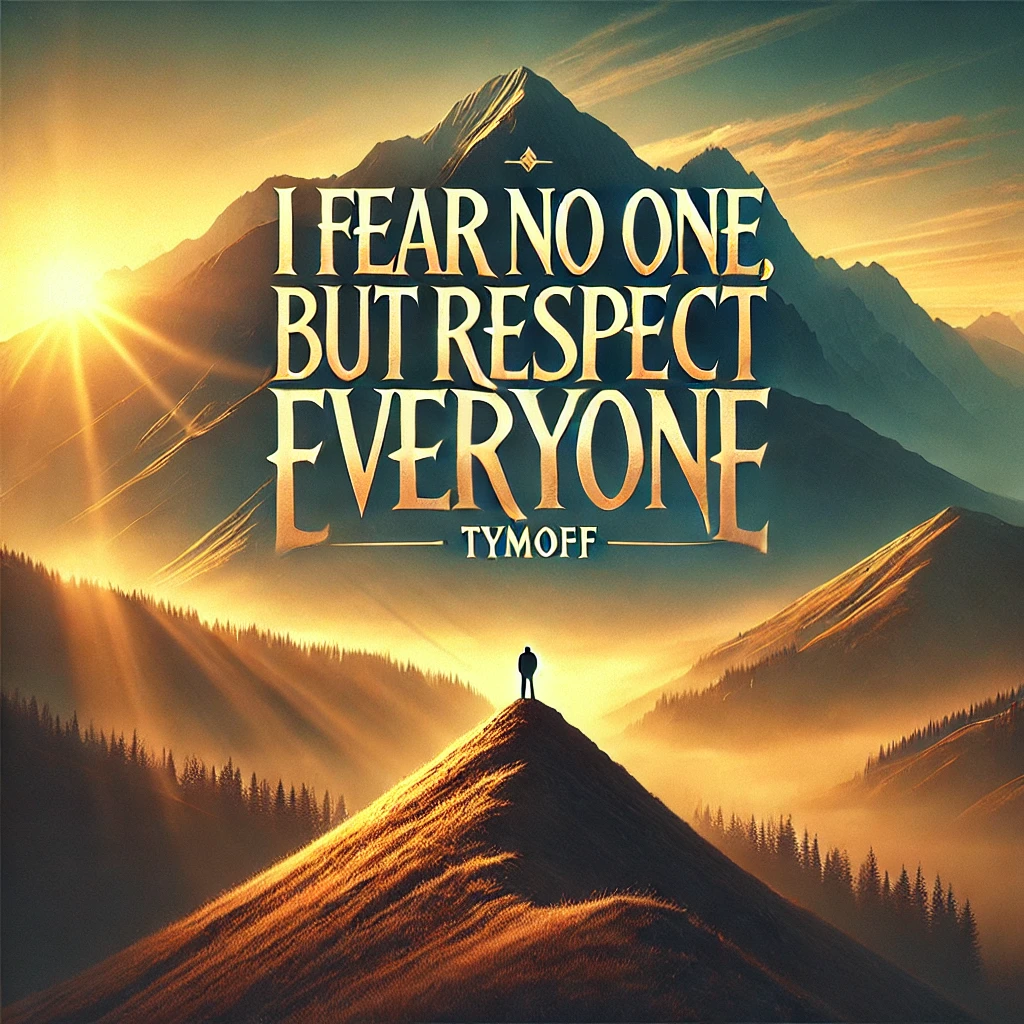In the complex and often tumultuous journey of life, individuals often encounter challenges, adversities, and a myriad of people with different worldviews and perspectives. The way one navigates these interactions, adversities, and challenges often shapes the essence of who they are as a person. One powerful philosophy that captures the essence of self-assurance and respect for others is the quote, “I fear no one, but respect everyone,” attributed to Tymoff. This simple yet profound statement brings together two powerful forces – strength and humility.
The Duality of Strength and Humility
At its core, Tymoff’s words reveal a duality that is crucial in the pursuit of personal and social harmony: strength and humility. These two qualities are often seen as opposing forces, yet they complement each other in the most meaningful way. Strength is typically associated with power, dominance, and the ability to overcome obstacles. Humility, on the other hand, is often seen as meekness, submission, and modesty. However, when these two forces are integrated, they create a balanced approach to life.
The phrase “I fear no one” suggests a person who is confident, secure in their own abilities, and not intimidated by the challenges that life may throw their way. Such a person does not bend under pressure, nor do they shrink from confrontation. Instead, they meet the world with an unwavering resolve, unshaken by the threats or opinions of others. This strength is born from self-assurance, inner peace, and a deep understanding of one’s own value.
However, this strength is not accompanied by arrogance or a desire to dominate. The second part of the quote, “but respect everyone,” highlights humility – the recognition of the inherent worth and dignity of every individual. It speaks to the importance of acknowledging the unique experiences, challenges, and perspectives that others bring to the table. This is the humility that allows a strong person to engage with others, not as a means to assert dominance, but as a way to build understanding and foster collaboration.
Understanding the Essence of Respect
In today’s world, respect is often viewed through the lens of etiquette, politeness, or mere acknowledgment of another’s presence. However, true respect goes much deeper. To respect someone is to recognize their inherent value as a human being, to understand their unique qualities, and to honor their thoughts, beliefs, and experiences, even if they differ from our own. Respect is about acknowledging the humanity in others and treating them with fairness, compassion, and understanding.
Tymoff’s quote reminds us that true respect is not contingent upon agreement. It does not require that we align with others on every issue, but rather that we acknowledge their right to exist as they are. Respect is recognizing that each individual has a unique path, struggles, and wisdom to share. This is not only a key principle in building strong, healthy relationships but also a cornerstone for fostering a more inclusive and harmonious society.
Moreover, respect in this context goes beyond mere tolerance. Tolerance may imply an acceptance of others’ differences, but it can be passive and indifferent. Respect, on the other hand, is active – it is a conscious choice to value others, to see them as equals, and to recognize their importance in the broader fabric of society.
The Relationship Between Fearlessness and Strength
To fear no one is to embrace one’s own power, but it is not a boastful or aggressive power. Fearlessness in this context means that a person is not intimidated by challenges, opposition, or even the presence of those who may seem more powerful. Fearlessness does not mean an absence of caution or wisdom; rather, it is a refusal to be controlled by fear itself. It means that the person has conquered their own inner fears, allowing them to move through the world with confidence and purpose.
When Tymoff states that they fear no one, they are speaking to a type of inner strength that allows them to face adversity head-on. This is a strength that comes from self-mastery, where fear no longer has the power to influence decisions or actions. The individual who fears no one is not afraid of failure, judgment, or even the unknown. They understand that life is a series of trials, and with each trial, they grow stronger.
This type of fearlessness is deeply empowering. It encourages people to take risks, to pursue their passions, and to challenge the status quo. People who fear no one are often trailblazers, innovators, and leaders. They refuse to let fear of the unknown, fear of rejection, or fear of failure limit their potential. Instead, they use fear as a motivator, a catalyst for growth, and a reminder that fear can be faced and conquered.
The Power of Empathy and Understanding
Respecting everyone, as Tymoff suggests, is not simply an outward action – it is an internal mindset. To truly respect others, one must cultivate empathy, which is the ability to understand and share the feelings of another person. Empathy requires us to step outside of ourselves and imagine what it would be like to walk in someone else’s shoes. It is through this empathy that we come to see others as equals, as human beings with hopes, dreams, and struggles similar to our own.
Empathy allows us to transcend superficial differences such as race, culture, gender, and socioeconomic status. It challenges us to look beyond surface-level judgments and to see the person beneath. In this way, respect becomes a deep, authentic connection to another individual. It is not about pretending to agree with someone or about accepting their behavior blindly, but about recognizing their humanity and the validity of their experiences.
When we respect others in this way, we create a space for meaningful dialogue, cooperation, and collaboration. Instead of seeing differences as obstacles or points of contention, we begin to view them as opportunities for learning and growth. In this sense, the respect that Tymoff speaks of is not just a passive acknowledgement, but an active, engaged understanding of others.
Balancing Fearlessness and Respect in Leadership
Leaders who embody the principles of fearlessness and respect inspire loyalty, admiration, and trust in those they lead. The fearlessness that Tymoff speaks of enables leaders to make bold decisions, take calculated risks, and confront challenges head-on. Their strength lies not in dominance, but in their unwavering belief in their mission, their values, and their ability to lead others through difficult situations.
At the same time, these leaders must also embrace respect for those they lead. A leader who respects others acknowledges the unique contributions of each individual on their team. They value diversity of thought, welcome feedback, and encourage collaboration. By respecting those they lead, they build a culture of trust and mutual support that fosters both personal and collective growth.
Fearless leaders are not afraid to stand alone when necessary, but they are also not too proud to learn from others. They understand that their strength is amplified when they respect and value the input of those around them. In this way, fearlessness and respect become intertwined, each enhancing the other.
Conclusion: Living with Strength and Humility
Tymoff’s philosophy, “I fear no one, but respect everyone,” encapsulates a powerful approach to living a meaningful life. It encourages us to be bold and fearless in the face of life’s challenges, while also remaining humble and respectful towards others. Strength, in this sense, is not about dominating others or imposing one’s will; it is about standing firm in one’s beliefs, values, and identity. Humility, on the other hand, is not about subservience or self-doubt; it is about recognizing and valuing the worth of others.
In a world often filled with division, conflict, and misunderstanding, this philosophy offers a path towards greater unity, empathy, and mutual respect. It teaches us that we can be strong without being arrogant, and we can respect others without being submissive. Ultimately, it is through this delicate balance of strength and humility that we create the conditions for personal growth, deeper connections, and a more harmonious world.
By embracing Tymoff’s words, we can all strive to live with a fearless heart and a respectful mind, knowing that true strength comes from the courage to be ourselves, and true respect comes from the wisdom to value others.



